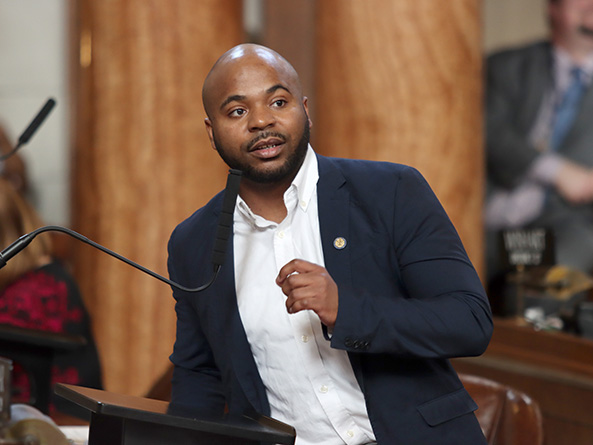Computer science requirement for public schools advanced
Lawmakers gave first-round approval March 8 to a bill intended to ensure that Nebraska students receive computer science and technology education before graduating from high school.
LB1112, introduced by Omaha Sen. Terrell McKinney, would require each public school district to include computer science and technology education in the instructional program of its elementary and middle schools beginning in school year 2024-25.
Additionally, districts would require students to complete at least one five-credit high school course in computer science and technology prior to graduation. Districts could offer the course in a traditional classroom setting, a blended learning environment or other technology-based format.
Computer science and technology education would include knowledge and skills related to computer literacy, educational technology, digital citizenship, information technology and computer science.
McKinney said LB1112 would ensure that students are prepared for 21st century jobs and help address a worker shortage that is hampering the growth of Nebraska technology companies.
“Technology and computer science [are] no longer limited to just coding classes that only a small handful of students choose to take as an elective,” he said. “Instead, technology and digital literacy [are] embedded in every industry our students choose to work in.”
McKinney said dozens of nonprofit organizations and higher education institutions have developed free course materials for school districts and professional development curriculum for teachers.
The bill would require each district to provide an annual status report to its school board and the state Department of Education that includes student progress in computer science and technology courses and other information.
LB1112 also would require the State Board of Education to adopt measurable academic content standards for computer science and technology education under the mathematics or science standards.
An Education Committee amendment, adopted 34-0, would allow the board to adopt the new standards under the career and technical education standards as well. It also would clarify that the graduation requirement would apply only to public schools.
McKinney introduced an amendment, adopted 35-0, under which the graduation requirement would begin with school year 2026-27. It also would allow students to complete a one-semester high school course in computer science and technology to fulfill the requirement.
Sen. Tony Vargas of Omaha supported LB1112. He said Arkansas, Mississippi and other states have passed similar measures intended to increase the number of technology workers and address the underrepresentation of minorities and people from low-income backgrounds in the technology industry.
“This is a step that we should have taken years ago,” Vargas said.
Sterling Sen. Julie Slama also supported the bill. Although many Nebraska school districts already offer computer science and technology courses, she said, LB1112 would help extend that opportunity to students in rural areas and those who do not have a computer at home.
“Computer science is a basic skill of life in this day and age,” Slama said, “and we’re setting our kids up to fail if we’re not ensuring that every kid in a Nebraska public school has a chance to learn these skills.”
Sen. Carol Blood of Bellevue said she is concerned that the bill would create an additional requirement for Nebraska school districts without also providing additional funding.
Henderson Sen. Curt Friesen said he is reluctant to make a computer science and technology course a graduation requirement. The state Department of Education is better suited than the Legislature to decide whether such education should be included in the K-12 curriculum, he said.
Senators voted 33-0 to advance LB1112 to select file.


